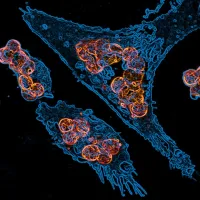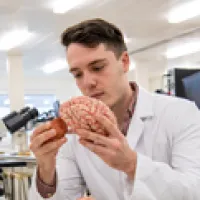About this course
Learn how to harness recent unprecedented advances in genomic technologies to improve patient outcomes on this master's in genomics. You’ll gain experience of exploring and applying data gained through sampling, sequencing and interpreting genomic information in both clinical and academic research.
We look at genomics in the context of medicine. This MSc is suitable for those with an interest in genomics research in academia, healthcare or industry. It's also ideal if you want to incorporate genomics into your professional practice in healthcare roles. Our students come from varied backgrounds such as life sciences, computer sciences and healthcare.
You’ll be able to tailor your learning to meet your professional goals.
Your pathway options are:
- MSc Genomics - choose from a wide range of optional modules to enhance your core genomics learning on this flexible pathway.
- MSc Genomics (Informatics) - you’ll develop specialist knowledge of genomics informatics, the science of problem-solving using data, and choose from topics such as programming and machine learning.
- MSc Genomics (Medicine) - you’ll study the impact of genomics in medicine, with core learning in stratified medicine and how genomics influences patient care.
Genomic medicine and bioinformatics are specialist research areas of the University. You’ll benefit from our close work with colleagues in local NHS departments, such as Wessex Clinical Genetics Service and genomic testing laboratories.
We have world-class research facilities, including the UK’s first dedicated Cancer Immunology Centre, and a leading supercomputer facility, Iridis 5.
During your research project, you’ll work alongside our research groups to contribute to the development of genomics, with many of our students publishing their work.
This course is available to take as an intercalated degree for undergraduate medical students. Intercalation means that you'll take a year out of your undergraduate medicine degree to gain this extra award.
Flexible study
If you prefer, you can apply to study this course as:
- a part-time master's - study the same course content over 2 or more years
You can also take a single module as part of continuing professional development (CPD). Explore modules that are available as CPD
Your modules and fees may vary if you choose a different study option.
We regularly review our courses to ensure and improve quality. This course may be revised as a result of this. Any revision will be balanced against the requirement that the student should receive the educational service expected. Find out why, when, and how we might make changes.
Our courses are regulated in England by the Office for Students (OfS).
Course lead
The leader of this course is Dr Reuben Pengelly. He has a broad range of research interests including cancer genomics, linkage disequilibrium, and rare disease genomics, as well as educational research. Alongside research, Reuben is heavily involved in education within the Faculty of Medicine, teaching on all BM programmes.
You can get in touch with our team by emailing genomics@soton.ac.uk.
“The high-quality teaching and hands-on workshops gave me so much confidence. It was inspiring to see the wide-reaching applications of genomic medicine from research, to patient care and public health.”
“There are opportunities to learn essential clinical, medical and bioinformatic genomics-related skills throughout the course, and teaching is delivered by lecturers genuinely interested in your progression, producing the next generation of scientists in a rapidly growing field.”
My MSc Genomics experience
Learn more about these subject areas
Course locations
This course is based at University Hospital Southampton and Highfield.
Awarding body
This qualification is awarded by the University of Southampton.
Download the Course Description Document
The Course Description Document details your course overview, your course structure and how your course is taught and assessed.
Entry requirements
You generally need at least a 2:2 degree in a subject such as:
• life sciences
• computer science
• medicine/nursing/ health sciences
We may be able to accept applications that do not meet the degree requirements. This is usually where you have evidence of relevant professional qualifications or experience.
This course is also available as an intercalated degree for undergraduate medical students, who have completed at least 3 years of their programme.
You must also demonstrate an understanding of the basic principles of genetics.
You must submit all supporting documents, including evidence that you can satisfy our English language requirement, when you submit your application.
Find the equivalent international qualifications for your country.
We do not accept Pre-sessional Language programmes as evidence of meeting the English Language requirement for this course.
English language requirements
If English isn't your first language, you'll need to complete an International English Language Testing System (IELTS) to demonstrate your competence in English. You'll need all of the following scores as a minimum:
IELTS score requirements
- overall score
- 7.0
- reading
- 6.5
- writing
- 6.5
- speaking
- 6.5
- listening
- 6.5
We accept other English language tests. Find out which English language tests we accept.
Pre-masters
If you don’t meet the English language requirements, you can achieve the level you need by completing a pre-sessional English programme before you start your course.
If you don’t meet the academic requirements, you can complete a pre-master's programme through our partnership with ONCAMPUS. Learn more about the programmes available.
Got a question?
Please contact us if you're not sure you have the right experience or qualifications to get onto this course.
Email: enquiries@southampton.ac.uk
Tel: +44(0)23 8059 5000
Course structure
Your studies will run for a full year, from September through to the following September for full-time study, or for 2 to 5 years part-time study
Your module choices will vary depending on which pathway you choose, but there are some everyone will need to study across all pathways.
These are:
- Principles of Genetics and Genomics
- Genomic Technologies and Basic Informatics
- Genomics in Practice
- Dissertation
Some of our pathways also have extra module requirements, including:
- Genomic (Informatics) - you'll study the Genomic Informatics module.
- Genomic (Medicine) - you'll study the Stratified Medicine module.
- Genomics - there are no additional modules you must study, instead you'll select an extra optional module to make up the required credits.
Each of these modules are also available as optional choices on the other pathways.
Over the last summer term, you’ll complete a dissertation on an area of genomics of interest to you. This research project can be lab-based, bioinformatic analysis, or a combination of both. As an alternative, you can also undertake a systematic literature review, or a project based on your professional practice.
For details of modules available to take as CPD, see the Medicine CPD module listing.
The information on this page refers to the full-time course. Your modules and fees may vary if you choose a different study option.
Want more detail? See all the modules in the course.
Modules
The modules outlined provide examples of what you can expect to learn on this degree course based on recent academic teaching. As a research-led University, we undertake a continuous review of our course to ensure quality enhancement and to manage our resources. The precise modules available to you in future years may vary depending on staff availability and research interests, new topics of study, timetabling and student demand. Find out why, when and how we might make changes.
Year 1 modules
You must study the following modules :
Genomic Informatics
This module is only compulsory for the MSc Genomics (Informatics) pathway, and optional for other pathways. This module will allow students to develop skills in analysis of data generated by different omic technologies, particularly giving experience in ...
Genomic Technologies and Basic Informatics
This module explores the state-of-the-art genomics techniques used for DNA sequencing (e.g. targeted approaches, whole exome and whole genome sequencing) and RNA sequencing, together with current technologies routinely used to investigate genomic variatio...
Genomics Dissertation
The dissertation module provides a context within which research skills can be developed. It provides the opportunity to apply and demonstrate the skills and knowledge acquired throughout the taught component of the MSc programme. The dissertation by res...
Genomics in Practice
This module puts genomics into practice, with a focus on the interpretation of genomic data in a clinical context. The module covers the synthesis of genomic information, and aligned research skills.
Principles of Genetics & Genomics
During the module students will review the architecture of the human genome, including both coding and non-coding elements, and the regulation of gene expression. Students will then explore the nature of genetic variation within the human genome, how it a...
Stratified Medicine
This module is only compulsory for the MSc Genomics (Medicine) pathway, and optional for other pathways. This module will cover the use of omics in stratified medicine. It will explore the different molecular and cellular actions of treatments, the genom...
You must also choose from the following modules :
Bioinformatics and Systems Biology
Large-scale approaches at the molecular, cellular, organismal and ecological level are revolutionizing biology by enabling systems-level questions to be addressed. In many cases, these approaches are driven by technologies that allow the components of bio...
Cancer Biology
This module is designed to provide an overview of the cellular and molecular biology of cancer and will run alongside the Immunology module in semester 1 to provide the foundations for the cancer immunology and immunotherapy module in semester 2. As a mu...
Communicable Disease Control with Genomics
To provide students with knowledge of the core concepts and skills required for communicable disease control.
Counselling skills in genomics for health care professionals
This module gives an introduction to the theory and practice of genomic counselling.
Engaging and involving the public with your science
Solving complex medical research questions and refining clinical care works best when done in collaboration between diverse public (including patients), researchers and health care practitioners. This sort of partnership requires exchange of knowledge, t...
Genomic Informatics
This module is only compulsory for the MSc Genomics (Informatics) pathway, and optional for other pathways. This module will allow students to develop skills in analysis of data generated by different omic technologies, particularly giving experience in ...
Laboratory Skills
This module will put into practice the theoretical concepts gained from Research Skills module in semester 1 and aims to provide a foundation for practical laboratory skills including; good laboratory practice and an appreciation for laboratory safety and...
Machine Learning Technologies (MSc)
Machine Learning is about extracting useful information from large and complex datasets. The module will cover the practical basis of how learning algorithms are can be applied. You will gain hands-on experience in laboratory-bases sessions. Exclusions...
Stratified Medicine
This module is only compulsory for the MSc Genomics (Medicine) pathway, and optional for other pathways. This module will cover the use of omics in stratified medicine. It will explore the different molecular and cellular actions of treatments, the genom...
Translational Medicine
The Translational Medicine module gives an overview of the regulatory, ethical and practical requirements of translating novel devices, processes, engineering or software solutions into a clinical setting. The use of pre-clinical models and the UK regulat...
Learning and assessment
Learning
This MSc is delivered in person at our Southampton campuses. You'll be supported by our extensive e-learning resources throughout.
We take an interdisciplinary approach, bringing together expertise from across the University. You’ll be taught by experts in genomics, clinical genetics, computing, maths and biological sciences.
Your exact learning activities will depend on the modules you take. As well as lectures and tutorials led by subject experts you'll learn through:
- seminars
- laboratory practicals
- interpretation of data
- clinical scenarios
You’ll be expected to undertake a significant amount of independent learning.
Assessment
Again your assessment will depend on the modules that you take, but assessment methods include:
- scenario-based exercises
- written exams and assignments
- case reports and data analysis
- oral presentations
- project proposals
Dissertation
Your dissertation can be either a research or a professional project. You’ll need to complete a 6,000-word report and present a summary to an audience.
Academic Support
You'll be supported by a personal academic tutor and have access to a senior tutor.
When you write your dissertation you’ll be supported by a primary supervisor on a one-to-one basis.
Careers
Genomics is an area of rapid change, with a particular skills shortage in bioinformatics, an area you can specialise in through this MSc.
Our Graduates have gone onto a wide range of careers within the sector, including:
- bioinformatics (in industry, healthcare and academia)
- graduate entry medicine
- NHS Scientist Training Programmes
- PhD programmes in Southampton and elsewhere
As well as gaining genomics specific knowledge and skills, you’ll gain many transferable skills, including:
- empathy and communication skills
- presentation skills
- academic writing
- an ability to integrate research evidence into all aspects of decision making
- the ability to apply knowledge, analytical and critical thinking skills to make sound judgements
- leadership skills, developing your ability to train others
Our dedicated genomics career workshop will help you decide which direction you'd like to take your career. This will also help you to tailor your CV to stand-out in the genomics job market.
Careers services at Southampton
We're a top 20 UK university for employability (QS Graduate Employability Rankings 2022). Our Careers, Employability and Student Enterprise team will support you throughout your time as a student and for up to 5 years after graduation. This support includes:
- work experience schemes
- CV/resume and interview skills workshops
- networking events
- careers fairs attended by top employers
- a wealth of volunteering opportunities
- study abroad and summer school opportunities
We have a thriving entrepreneurship culture. You'll be able to take advantage of:
- our dedicated start-up incubator, Futureworlds
- a wide variety of enterprise events run throughout the year
- our partnership in the world’s number 1 business incubator, SETsquared
Fees, costs and funding
Tuition fees
Fees for a year's study:
- UK students pay £10,400.
- EU and international students pay £28,900.
Deposit
If you're an international student on a full-time course, we'll ask you to pay £2,000 of your tuition fees in advance, as a deposit.
Your offer letter will tell you when this should be paid and provide full terms and conditions.
Find out about exemptions, refunds and how to pay your deposit on our tuition fees for overseas students page.
What your fees pay for
Your tuition fee covers the full cost of tuition and any exams. The fee you pay will remain the same each year from when you start studying this course. This includes if you suspend and return.
Find out how to pay your tuition fees.
Accommodation and living costs, such as travel and food, are not included in your tuition fees. There may also be extra costs for retake and professional exams.
Explore:
10% alumni discount
If you’re a graduate of the University of Southampton, you could be eligible for a 10% discount on your postgraduate tuition fees.
Postgraduate Master’s Loans (UK nationals only)
This can help with course fees and living costs while you study a postgraduate master's course. Find out if you're eligible.
Southampton Genomics Talent Scholarship
A competitive scholarship of £2,000 or £1,000 is available to UK or international students studying the full-time MSc Genomics programme.
Find out more about the Southampton Genomics Talent Scholarship, including eligibility criteria and how to apply.
Southampton Medicine Postgraduate International Scholarship
A scholarship of £3,000 is available to international students studying for a postgraduate master’s in Medicine.
Find out more about the Southampton Medicine Postgraduate International Scholarship, including eligibility and conditions.
Other postgraduate funding options
A variety of additional funding options may be available to help you pay for your master’s study. Both from the University and other organisations.
Funding for EU and international students
Find out about funding you could get as an international student.
How to apply
- Use the 'apply for this course' button on this page to take you to our online application form.
- Search for the course you want to apply for.
- Complete the application form and upload any supporting documents.
- Submit your application.
For further details, read our step by step guide to postgraduate taught applications.
Application deadlines
- International applicants: Monday 29 July 2024, midday UK time
- UK applicants: Friday 30 August 2024, midday UK time
Application assessment fee
We’ll ask you to pay a £50 application assessment fee if you’re applying for a postgraduate taught course.
This is an extra one-off charge which is separate to your tuition fees and is payable per application. It covers the work and time it takes us to assess your application. You’ll be prompted to pay when you submit your application which won’t progress until you've paid.
If you're a current or former University of Southampton student, or if you’re applying for certain scholarships, you will not need to pay the fee. PGCE applications through GOV.UK and Master of Research (MRes) degree applications are also exempt. Find out if you’re exempt on our terms and conditions page.
Single module (CPD) applications
To apply for a single module (CPD), you'll need to fill in a physical application form that you can download from our continuing professional development pages.
Supporting information
When you apply you’ll need to submit a personal statement explaining why you want to take the course.
You’ll need to include information about:
- your knowledge of the subject area
- why you want to study a postgraduate qualification in this course
- how you intend to use your qualification
You'll also need to submit two references, one academic reference and one academic or professional reference.
Please include the required paperwork showing your first degree and your IELTS English language test score (if you are a non-native English speaker) with your application. Without these, your application may be delayed.
You may also be asked to provide:
- a degree transcript
- evidence of professional qualifications
What happens after you apply
You'll be able to track your application through our online Applicant Record System.
We will aim to send you a decision 6 weeks after you have submitted your application.
Unfortunately, due to number of applications we receive, we may not be able to give you specific feedback on your application if you are unsuccessful.
Equality and diversity
We treat and select everyone in line with our Equality and Diversity Statement.
Got a question?
Please contact us if you're not sure you have the right experience or qualifications to get onto this course.
Email: enquiries@southampton.ac.uk
Tel: +44(0)23 8059 5000
Related courses
-
Study
- View all courses
- Taught postgraduate study
- Pre-sessional English courses
-
Subjects
- Acoustical engineering
- Audiology
- Biomedical and medical engineering
- Civil engineering
- Every day I’m completely immersed in an environment that’s creative in all aspects
- Everything I learn feels so relevant, even If it’s a subject rooted in the past
- Maritime engineering
- Photonics and optoelectronics
- Social statistics and demography
-
PhDs and research degrees
- Create your own research project
-
Find a PhD project
- A missing link between continental shelves and the deep sea: Have we underestimated the importance of land-detached canyons?
- A seismic study of the continent-ocean transition southwest of the UK
- A study of rolling contact fatigue in electric vehicles (EVs)
- Acoustic monitoring of forest exploitation to establish community perspectives of sustainable hunting
- Acoustic sensing and characterisation of soil organic matter
- Advancing intersectional geographies of diaspora-led development in times of multiple crises
- Aero engine fan wake turbulence – Simulation and wind tunnel experiments
- Against Climate Change (DACC): improving the estimates of forest fire smoke emissions
- All-in-one Mars in-situ resource utilisation (ISRU) system and life-supporting using non-thermal plasma
- An electromagnetic study of the continent-ocean transition southwest of the UK
- An investigation of the relationship between health, home and law in the context of poor and precarious housing, and complex and advanced illness
- Antibiotic resistance genes in chalk streams
- Being autistic in care: Understanding differences in care experiences including breakdowns in placements for autistic and non-autistic children
- Biogeochemical cycling in the critical coastal zone: Developing novel methods to make reliable measurements of geochemical fluxes in permeable sediments
- Bloom and bust: seasonal cycles of phytoplankton and carbon flux
- British Black Lives Matter: The emergence of a modern civil rights movement
- Building physics for low carbon comfort using artificial intelligence
- Building-resolved large-eddy simulations of wind and dispersion over a city scale urban area
- Business studies and management: accounting
- Business studies and management: banking and finance
- Business studies and management: decision analytics and risk
- Business studies and management: digital and data driven marketing
- Business studies and management: human resources (HR) management and organisational behaviour
- Business studies and management: strategy, innovation and entrepreneurship
- Carbon storage in reactive rock systems: determining the coupling of geo-chemo-mechanical processes in reactive transport
- Cascading hazards from the largest volcanic eruption in over a century: What happened when Hunga Tonga-Hunga Ha’apai erupted in January 2022?
- Characterisation of cast austenitic stainless steels using ultrasonic backscatter and artificial intelligence
- Climate Change effects on the developmental physiology of the small-spotted catshark
- Climate at the time of the Human settlement of the Eastern Pacific
- Collaborative privacy in data marketplaces
- Compatibility of climate and biodiversity targets under future land use change
- Cost of living in modern and fossil animals
- Creative clusters in rural, coastal and post-industrial towns
- Deep oceanic convection: the outsized role of small-scale processes
- Defect categories and their realisation in supersymmetric gauge theory
- Defining the Marine Fisheries-Energy-Environment Nexus: Learning from shocks to enhance natural resource resilience
- Design and fabrication of next generation optical fibres
- Developing a practical application of unmanned aerial vehicle technologies for conservation research and monitoring of endangered wildlife
- Development and evolution of animal biomineral skeletons
- Development of all-in-one in-situ resource utilisation system for crewed Mars exploration missions
- Ecological role of offshore artificial structures
- Effect of embankment and subgrade weathering on railway track performance
- Efficient ‘whole-life’ anchoring systems for offshore floating renewables
- Electrochemical sensing of the sea surface microlayer
- Engagement with nature among children from minority ethnic backgrounds
- Enhancing UAV manoeuvres and control using distributed sensor arrays
- Ensuring the Safety and Security of Autonomous Cyber-Physical Systems
- Environmental and genetic determinants of Brassica crop damage by the agricultural pest Diamondback moth
- Estimating marine mammal abundance and distribution from passive acoustic and biotelemetry data
- Evolution of symbiosis in a warmer world
- Examining evolutionary loss of calcification in coccolithophores
- Explainable AI (XAI) for health
- Explaining process, pattern and dynamics of marine predator hotspots in the Southern Ocean
- Exploring dynamics of natural capital in coastal barrier systems
- Exploring the mechanisms of microplastics incorporation and their influence on the functioning of coral holobionts
- Exploring the potential electrical activity of gut for healthcare and wellbeing
- Exploring the trans-local nature of cultural scene
- Facilitating forest restoration sustainability of tropical swidden agriculture
- Faulting, fluids and geohazards within subduction zone forearcs
- Faulting, magmatism and fluid flow during volcanic rifting in East Africa
- Fingerprinting environmental releases from nuclear facilities
- Flexible hybrid thermoelectric materials for wearable energy harvesting
- Floating hydrokinetic power converter
- Glacial sedimentology associated subglacial hydrology
- Green and sustainable Internet of Things
- How do antimicrobial peptides alter T cell cytokine production?
- How do calcifying marine organisms grow? Determining the role of non-classical precipitation processes in biogenic marine calcite formation
- How do neutrophils alter T cell metabolism?
- How well can we predict future changes in biodiversity using machine learning?
- Hydrant dynamics for acoustic leak detection in water pipes
- If ‘Black Lives Matter’, do ‘Asian Lives Matter’ too? Impact trajectories of organisation activism on wellbeing of ethnic minority communities
- Illuminating luciferin bioluminescence in dinoflagellates
- Imaging quantum materials with an XFEL
- Impact of neuromodulating drugs on gut microbiome homeostasis
- Impact of pharmaceuticals in the marine environment in a changing world
- Impacts of environmental change on coastal habitat restoration
- Improving subsea navigation using environment observations for long term autonomy
- Information theoretic methods for sensor management
- Installation effect on the noise of small high speed fans
- Integrated earth observation mapping change land sea
- Interconnections of past greenhouse climates
- Investigating IgG cell depletion mechanisms
- Is ocean mixing upside down? How mixing processes drive upwelling in a deep-ocean basin
- Landing gear aerodynamics and aeroacoustics
- Lightweight gas storage: real-world strategies for the hydrogen economy
- Long-term change in the benthos – creating robust data from varying camera systems
- Machine learning for multi-robot perception
- Machine learning for multi-robot perception
- Marine ecosystem responses to past climate change and its oceanographic impacts
- Mechanical effects in the surf zone - in situ electrochemical sensing
- Microfluidic cell isolation systems for sepsis
- Migrant entrepreneurship, gender and generation: context and family dynamics in small town Britain
- Miniaturisation in fishes: evolutionary and ecological perspectives
- Modelling high-power fibre laser and amplifier stability
- Modelling soil dewatering and recharge for cost-effective and climate resilient infrastructure
- Modelling the evolution of adaptive responses to climate change across spatial landscapes
- Nanomaterials sensors for biomedicine and/or the environment
- New high-resolution observations of ocean surface current and winds from innovative airborne and satellite measurements
- New perspectives on ocean photosynthesis
- Novel methods of detecting carbon cycling pathways in lakes and their impact on ecosystem change
- Novel technologies for cyber-physical security
- Novel transparent conducting films with unusual optoelectronic properties
- Novel wavelength fibre lasers for industrial applications
- Ocean circulation and the Southern Ocean carbon sink
- Ocean influence on recent climate extremes
- Ocean methane sensing using novel surface plasmon resonance technology
- Ocean physics and ecology: can robots disentangle the mix?
- Ocean-based Carbon Dioxide Removal: Assessing the utility of coastal enhanced weathering
- Offshore renewable energy (ORE) foundations on rock seabeds: advancing design through analogue testing and modelling
- Optical fibre sensing for acoustic leak detection in buried pipelines
- Optimal energy transfer in nonlinear systems
- Optimal energy transfer in nonlinear systems
- Optimizing machine learning for embedded systems
- Oxidation of fossil organic matter as a source of atmospheric CO2
- Partnership dissolution and re-formation in later life among individuals from minority ethnic communities in the UK
- Personalized multimodal human-robot interactions
- Preventing disease by enhancing the cleaning power of domestic water taps using sound
- Quantifying riparian vegetation dynamics and flow interactions for Nature Based Solutions using novel environmental sensing techniques
- Quantifying the response and sensitivity of tropical forest carbon sinks to various drivers
- Quantifying variability in phytoplankton electron requirements for carbon fixation
- Resilient and sustainable steel-framed building structures
- Resolving Antarctic meltwater events in Southern Ocean marine sediments and exploring their significance using climate models
- Robust acoustic leak detection in water pipes using contact sound guides
- Silicon synapses for artificial intelligence hardware
- Smart photon delivery via reconfigurable optical fibres
- The Gulf Stream control of the North Atlantic carbon sink
- The Mayflower Studentship: a prestigious fully funded PhD studentship in bioscience
- The calming effect of group living in social fishes
- The duration of ridge flank hydrothermal exchange and its role in global biogeochemical cycles
- The evolution of symmetry in echinoderms
- The impact of early life stress on neuronal enhancer function
- The oceanic fingerprints on changing monsoons over South and Southeast Asia
- The role of iron in nitrogen fixation and photosynthesis in changing polar oceans
- The role of singlet oxygen signaling in plant responses to heat and drought stress
- Time variability on turbulent mixing of heat around melting ice in the West Antarctic
- Triggers and Feedbacks of Climate Tipping Points
- Uncovering the drivers of non-alcoholic fatty liver disease progression using patient derived organoids
- Understanding recent land-use change in Snowdonia to plan a sustainable future for uplands: integrating palaeoecology and conservation practice
- Understanding the role of cell motility in resource acquisition by marine phytoplankton
- Understanding the structure and engagement of personal networks that support older people with complex care needs in marginalised communities and their ability to adapt to increasingly ‘digitalised’ health and social care
- Unpicking the Anthropocene in the Hawaiian Archipelago
- Unraveling oceanic multi-element cycles using single cell ionomics
- Unravelling southwest Indian Ocean biological productivity and physics: a machine learning approach
- Using acoustics to monitor how small cracks develop into bursts in pipelines
- Using machine learning to improve predictions of ocean carbon storage by marine life
- Vulnerability of low-lying coastal transportation networks to natural hazards
- Wideband fibre optical parametric amplifiers for Space Division Multiplexing technology
- Will it stick? Exploring the role of turbulence and biological glues on ocean carbon storage
- X-ray imaging and property characterisation of porous materials
- Funding your research degree
- How to apply for a PhD or research degree
- How to make a PhD enquiry
- Support while studying your PhD or research degree
- Exchanges and studying abroad
- Undergraduate study
-
Tuition fees and funding
-
Scholarships
-
Postgraduate scholarships for UK students
- Postgraduate Taught Diversity Scholarship (Environmental and Life Sciences)
- Southampton Business School Postgraduate UK Scholarship
- Southampton Genomics Talent Scholarship
- Southampton History Patricia Mather and Helen Patterson Scholarship
- Southampton MA Holocaust scholarships
- Southampton Philosophy David Humphris-Norman Scholarship
- The National Institute for Health and care Research South Central INSIGHT Programme
- Southampton Physics and Astronomy Achievement Scholarship
- GREAT Scholarships 2024 – Greece
- Undergraduate scholarships for UK students
- Competitive scholarships for international postgraduates
- Competitive scholarships for international undergraduates
- Merit scholarships for international postgraduates
- Merit scholarships for international undergraduates
-
Partnership scholarships for international students
- Scholarships, awards and funding opportunities
- Becas Chile Scholarship
- Chevening Scholarships
- China Scholarship Council Scholarships
- COLFUTURO Scholarships
- Commonwealth Distance Learning Scholarships
- Commonwealth Master's Scholarships
- Commonwealth PhD Scholarships
- Commonwealth PhD Scholarships for high income countries
- Commonwealth Shared Scholarships
- Commonwealth Split-Site Scholarships
- FIDERH Scholarships
- Fulbright Awards
- FUNED Scholarships
- Great Scholarships 2024 – India
- Great Scholarships 2024 – Bangladesh
- Great Scholarships 2024 – Mexico
- Great Scholarships 2024 – Nigeria
- Marshall Scholarship
- Saïd Foundation Scholarships
- British Council Scholarships for Women in STEM
- Xiamen University PhD Scholarships
- GREAT scholarships for justice and law 2024 – Indonesia
- Scholarship terms and conditions
- Southampton Education Civic Scholarship
- Southampton Ageing and Gerontology Talent Scholarship
- Southampton Canadian Prestige Scholarship for Law
- Southampton Presidential International Scholarship
-
Postgraduate scholarships for UK students
-
Scholarships
- Short courses
- Lunchtime evening and weekend courses
- Clearing
- Summer schools
- Get a prospectus
-
Student life
-
Accommodation
- Choose your halls of residence
- Apply for accommodation
- Guaranteed accommodation
- Your accommodation options
- Accommodation for those with additional requirements
- International and pre-sessional students
- Postgraduate accommodation
- Couples and students with children
- Renting privately
- Our accommodation areas
- Privacy notice
- Terms and conditions
- Fees and contracts
- Our cities
- Sports and gyms
- Our campuses
- Join our student community
- Support and money
-
Accommodation
-
Research
- Our impact
- Research projects
- Research areas
- Research facilities
- Collaborate with us
-
Institutes, centres and groups
- Active Living
- Advanced Fibre Applications
- Advanced Laser Laboratory
- Advanced Project Management Research Centre
- Antibody and Vaccine Group
- Astronomy Group
- Autism Community Research Network @ Southampton (ACoRNS)
- Bioarchaeology and Osteoarchaeology at Southampton (BOS)
- Bladder and Bowel Management
- Cell and Developmental Biology
- Centre for Defence and Security Research
- Centre for Developmental Origins of Health and Disease
- Centre for Digital Finance
- Centre for Eastern European and Eurasian Studies (CEEES)
- Centre for Empirical Research in Finance and Banking (CERFIB)
- Centre for Geometry, Topology, and Applications
- Centre for Global Englishes
- Centre for Global Health and Policy (GHaP)
- Centre for Health Technologies
- Centre for Healthcare Analytics
- Centre for Human Development, Stem Cells and Regeneration
- Centre for Imperial and Postcolonial Studies
- Centre for Inclusive and Sustainable Entrepreneurship and Innovation (CISEI)
- Centre for International Film Research (CIFR)
- Centre for International Law and Globalisation
- Centre for Internet of Things and Pervasive Systems
- Centre for Justice Studies
- Centre for Linguistics, Language Education and Acquisition Research
- Centre for Machine Intelligence
- Centre for Maritime Archaeology
- Centre for Medieval and Renaissance Culture (CMRC)
- Centre for Modern and Contemporary Writing (CMCW)
- Centre for Music Education and Social Justice
- Centre for Political Ethnography (CPE)
- Centre for Research in Accounting, Accountability and Governance
- Centre for Research on Work and Organisations
- Centre for Resilient Socio-Technical Systems
- Centre for Transnational Studies
- Child and Adolescent Research Group
- Clinical Ethics, Law and Society (CELS)
- Computational Nonlinear Optics
- Cyber Security Academy
- Data Science Group
- Digital Oceans
- EPSRC and MOD Centre for Doctoral Training in Complex Integrated Systems for Defence and Security
- Economic Theory and Experimental Economics
- Economy, Society and Governance
- Electrical Power Engineering
- Environmental Hydraulics
- Gas Photonics in Hollow Core Fibres
- Geochemistry
- Global Health (Demography)
- Global Health Community of Practice
- Gravity group
- Healthy Oceans
- High Power Fibre Lasers
- Hollow Core Fibre
- Human Genetics and Genomic Medicine
- Infection
- Infrastructure Group
- Institute of Maritime Law (IML)
- Integrated Photonic Devices
- Integrative Molecular Phenotyping Centre
- Interdisciplinary Musculoskeletal Health
- International Centre for Ecohydraulics Research (ICER)
- Language Assessment and Testing Unit (LATU)
- Laser-Direct-Write (LDW) Technologies for Biomedical Applications
- Law and Technology Centre
- Long Term Conditions
- Magnetic Resonance
- Mathematical Modelling
- Medicines Management
- Molecular and Precision Biosciences
- Multiwavelength Accretion and Astronomical Transients
- National Biofilms Innovation Centre (NBIC)
- National Centre for Research Methods
- National Infrastructure Laboratory
- Nature-Based Ocean Solutions
- Nonlinear Semiconductor Photonics
- Ocean Perception Group
- Operational Research
- Optical Engineering and Quantum Photonics Group
- Paediatrics and Child Health - Clinical and Experimental Sciences
- People, Property, Community
- Photonic Systems, Circuits and Sensors Group
- Physical Optics
- Primary Care Research Centre
- Product Returns Research Group (PRRG)
- Quantum, Light and Matter Group
- Silica Fibre Fabrication
- Silicon Photonics
- Skin Sensing Research Group
- Southampton Centre for Nineteenth-Century Research
- Southampton Ethics Centre
- Southampton Health Technology Assessments Centre (SHTAC)
- Southampton High Energy Physics group
- Southampton Imaging
- Southampton Theory Astrophysics and Gravity (STAG) Research Centre
- Stefan Cross Centre for Women, Equality and Law
- String theory and holography
- The India Centre for Inclusive Growth and Sustainable Development
- The Parkes Institute
- Tony Davies High Voltage Laboratory
- Ultrafast X-ray Group
- Vision Science
- WSA Exchange
- Work Futures Research Centre (WFRC)
- Support for researchers
- Faculties, schools and departments
- Research jobs
- Find people and expertise
- Business
- Global
- About
- Visit
- Alumni
- Departments
- News
- Events
- Contact

Advanced Biological Sciences

Allergy

Allergy

Allergy

Big Data Biology

Biodiversity and Conservation

Biomedical Sciences by Research

Cancer Biology and Immunology






